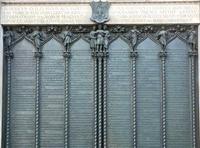Discoveries from the Fleisher Collection: Mendelssohn and Bach and Reformation
By Fleisher CollectionNote: This broadcast took place on Saturday, November 4, 2017, 5:00 p.m. – 6:00 p.m.
- Felix Mendelssohn (1809–1847). Symphony No. 5, Reformation
- Johann Sebastian Bach (1685–1750). Cantata 80, Ein' feste Burg ist unser Gott
Anniversaries bump into each other on this month's Discoveries. It's been 500 years since the beginning of the Reformation, almost to the day, when Martin Luther posted 95 theological and ecclesiastical points he wished to debate with all comers. Nobody dared to take him up on it, but from the door of the Wittenberg Castle Church in 1517, a revolution in religion, humanism, freedom, and language swept across the world.
The dust was far from settling in 1530 when the "Lutherans," as they were being called, put together a meticulously reasoned defense of what they believed and presented it to Charles V, the Holy Roman Emperor. They wrote it in Augsburg, so this Augsburg Confession became a founding document of Lutheranism, and, by extension, a pivotal moment for what would become Germany. In 1830, the 300th anniversary of that Confession, celebrations took place throughout Germany, particularly in Augsburg itself.
Felix Mendelssohn had already begun composing a celebratory symphony for this in 1829. But because of illness and touring, he missed the deadline. He had offered a version of it to Augsburg, but the city turned it down. A Paris orchestra also demurred. Mendelssohn finally completed it and conducted the premiere in 1832, in Berlin.
He placed into the symphony's beginning what is known as the "Dresden Amen," a bit of liturgical music known well in both Catholic and Lutheran churches. Wagner would later quote it in Parsifal and elsewhere. But Mendelssohn put the big statement of the Reformation—its national anthem, you might say—in the last movement. Martin Luther's music for his own versification of Psalm 46, "A Mighty Fortress Is Our God" (Ein feste Burg ist unser Gott) receives a grand treatment from Mendelssohn. He later didn't care for the youthful work, but after his death this second symphony of his was discovered and listed as No. 5.
The 80th in the catalog of cantatas by Johann Sebastian Bach uses the same Luther tune, but it took a while to reach the form we now know. This "Ein' feste Burg" Cantata was used in Leipzig, where Bach lived from 1723 until his death in 1750. But he actually wrote much of the music when he was in Weimar, mostly from 1708 until 1717. It was for Lent, but Leipzig would not permit extravagant cantatas during this penitential season, so Bach rewrote it for the Feast of the Reformation on October 31st, and revised it again, sometime in the late 1720s and early '30s.
What a work this is. Many of the Bach cantatas are intimate and jewel-like, but this is a huge outpouring of jubilant praise and musical explosion. The expansive opening choral fantasia is one of the most elaborate motets ever written. This is the Bach that astounds us just he did Felix Mendelssohn, when the 20 year old revived Bach's St. Matthew Passion for its 100th anniversary—in 1829, the same year he began composing the Reformation Symphony.
Listen to Discoveries from the Fleisher Collection the first Saturday of each month from 5:00 p.m. to 6:00 p.m. on WRTI 90.1 FM Philadelphia, 97.7 Reading, 97.1 Allentown, WJAZ 91.7 Harrisburg, 90.7 York, WRTL 90.7 Lancaster Ephrata Lebanon, WRTY 91.1 Mount Pocono, 94.9 Wilkes-Barre, 99.1 Pottsville, 106.1 Scranton, WRTQ 91.3 Ocean City, WRTX 91.7 Dover, and on the web at www.wrti.org. Hosted by Kile Smith, former Curator of the Fleisher Collection, and Jack Moore, Program Director of WRTI. Encore presentations of the entire Discoveries series can be heard every Wednesday at 7:00 p.m. on WRTI-HD2 and you can explore the archives of the radio program essays dating back to 2002.
Have a question for Free Library staff? Please submit it to our Ask a Librarian page and receive a response within two business days.

